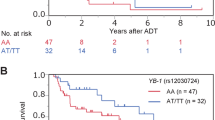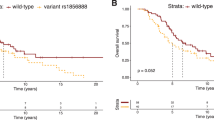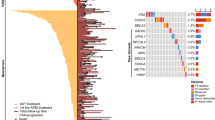Abstract
Missense polymorphism in HSD3B1, encoding 3β-hydroxysteroid dehydrogenase-1, was associated with outcome after abiraterone treatment. Other androgen-metabolizing enzymes may be involved in therapeutic effect in abiraterone. In this study, we investigated the significance of polymorphisms in genes involved in androgen and abiraterone metabolisms in prostate cancer patients treated with abiraterone. A total of 99 Japanese male castration-resistant prostate cancer patients treated with abiraterone between 2014 and 2018 were included. Genomic DNA was obtained from whole blood samples, and genotyping on SRD5A2 (rs523349), CYP17A1 (rs743572), CYP17A1 (rs2486758), and AKR1C3 (rs12529) was performed by PCR-based technique. Among the 99 patients, 32 (32.3%), 49 (49.5%), and 18 patients (18.2%) carried GG, GC, and CC alleles in SRD5A2, respectively. CC allele was associated with lower risk of treatment failure (hazard ratio, 0.43; 95% confidence interval, 0.20–0.87; P = 0.017) on multivariate analyses, compared with GG/GC alleles. In the combination model using HSD3B1 and SRD5A2 polymorphisms, compared with the combination of AA in HSD3B1 and GG/GC in SRD5A2, other combinations were associated with lower risk of treatment failure (hazard ratio, 0.34; 95% confidence interval, 0.17–0.62; P = 0.0003) on multivariate analyses. This study showed that SRD5A2 genetic variation was associated with the risk of treatment failure in abiraterone. Combinational use of genetic variation in HSD3B1 with SRD5A2 genetic variation augmented the ability of prognostic stratification.
This is a preview of subscription content, access via your institution
Access options
Subscribe to this journal
Receive 6 print issues and online access
$259.00 per year
only $43.17 per issue
Buy this article
- Purchase on Springer Link
- Instant access to full article PDF
Prices may be subject to local taxes which are calculated during checkout


Similar content being viewed by others
References
Shiota M, Yokomizo A, Naito S. Pro-survival and anti-apoptotic properties of androgen receptor signaling by oxidative stress promote treatment resistance in prostate cancer. Endocr Relat Cancer. 2012;19:R243–53.
Montgomery RB, Mostaghel EA, Vessella R, Hess DL, Kalhorn TF, Higano CS, et al. Maintenance of intratumoral androgens in metastatic prostate cancer: a mechanism for castration-resistant tumor growth. Cancer Res. 2008;68:4447–54.
Locke JA, Guns ES, Lubik AA, Adomat HH, Hendy SC, Wood CA, et al. Androgen levels increase by intratumoral de novo steroidogenesis during progression of castration-resistant prostate cancer. Cancer Res. 2008;68:6407–15.
Nacusi LP, Tindall DJ. Targeting 5α-reductase for prostate cancer prevention and treatment. Nat Rev Urol. 2011;8:378–84.
Price DK, Chau CH, Till C, Goodman PJ, Leach RJ, Johnson-Pais TL, et al. Association of androgen metabolism gene polymorphisms with prostate cancer risk and androgen concentrations: Results from the Prostate Cancer Prevention Trial. Cancer. 2016;122:2332–40.
Makridakis N, Ross RK, Pike MC, Chang L, Stanczyk FZ, Kolonel LN, et al. A prevalent missense substitution that modulates activity of prostatic steroid 5alpha-reductase. Cancer Res. 1997;57:1020–2.
Shiota M, Fujimoto N, Yokomizo A, Takeuchi A, Itsumi M, Inokuchi J, et al. SRD5A gene polymorphism in Japanese men predicts prognosis of metastatic prostate cancer with androgen-deprivation therapy. Eur J Cancer. 2015;51:1962–9.
Shiota M, Fujimoto N, Yokomizo A, Takeuchi A, Kashiwagi E, Dejima T, et al. The prognostic impact of serum testosterone during androgen-deprivation therapy in patients with metastatic prostate cancer and the SRD5A2 polymorphism. Prostate Cancer Prostatic Dis. 2016;19:191–6.
Fizazi K, Tran N, Fein L, Matsubara N, Rodriguez-Antolin A, Alekseev BY, et al. Abiraterone plus prednisone in metastatic, castration-sensitive prostate cancer. N Engl J Med. 2017;377:352–60.
James ND, de Bono JS, Spears MR, Clarke NW, Mason MD, Dearnaley DP, et al. Abiraterone for prostate cancer not previously treated with hormone therapy. N Engl J Med. 2017;377:338–51.
Li Z, Bishop AC, Alyamani M, Garcia JA, Dreicer R, Bunch D, et al. Conversion of abiraterone to D4A drives anti-tumour activity in prostate cancer. Nature. 2015;523:347–51.
Shiota M, Narita S, Akamatsu S, Fujimoto N, Sumiyoshi T, Fujiwara M, et al. Association of missense polymorphism in HSD3B1 with outcomes among men with prostate cancer treated with androgen-deprivation therapy or abiraterone. JAMA Netw Open. 2019;2:e190115.
Li Z, Alyamani M, Li J, Rogacki K, Abazeed M, Upadhyay SK, et al. Redirecting abiraterone metabolism to fine-tune prostate cancer anti-androgen therapy. Nature. 2016;533:547–51.
International Union Against Cancer. Urologic tumors. Prostate. In: Sobin LH, Wittekind CH (editors). TNM classification of malignant tumors. 5th ed. New York: John Wiley & Sons; 1997. p. 170–3.
Scher HI, Halabi S, Tannock I, Morris M, Sternberg CN, Carducci MA, et al. Design and end points of clinical trials for patients with progressive prostate cancer and castrate levels of testosterone: recommendations of the Prostate Cancer Clinical Trials Working Group. J Clin Oncol. 2008;26:1148–59.
Shiota M, Fujimoto N, Imada K, Yokomizo A, Itsumi M, Takeuchi A, et al. Potential role for YB-1 in castration-resistant prostate cancer and resistance to enzalutamide through the androgen receptor V7. J Natl Cancer Inst. 2016;108:djw005.
Shiota M, Fujimoto N, Itsumi M, Takeuchi A, Inokuchi J, Tatsugami K, et al. Gene polymorphisms in antioxidant enzymes correlate with the efficacy of androgen-deprivation therapy for prostate cancer with implications of oxidative stress. Ann Oncol. 2017;28:569–75.
Binder M, Zhang BY, Hillman DW, Kohli R, Kohli T, Lee A, et al. Common genetic variation in CYP17A1 and response to abiraterone acetate in patients with metastatic castration-resistant prostate cancer. Int J Mol Sci. 2016;17:E1097.
McKay RR, Werner L, Mostaghel EA, Lis R, Voznesensky O, Zhang Z, et al. A phase II trial of abiraterone combined with dutasteride for men with metastatic castration-resistant prostate cancer. Clin Cancer Res. 2017;23:935–45.
Acknowledgements
This work was supported by a JSPS KAKENHI grant (17K11145) to MS. The funder had no role in study design, data collection, data analysis, interpretation, or writing of the report. The authors would like to thank Ms. Noriko Hakoda and Ms. Eriko Gunshima for technical assistance. The authors thank Edanz Group (www.edanzediting.com/ac) for editing a draft of this manuscript.
Author information
Authors and Affiliations
Corresponding author
Ethics declarations
Conflict of interest
MS, SA, SN, OO, TH, and ME received honoraria from Janssen Pharmaceutical. The other authors declare no conflict of interest.
Additional information
Publisher’s note Springer Nature remains neutral with regard to jurisdictional claims in published maps and institutional affiliations.
Rights and permissions
About this article
Cite this article
Shiota, M., Akamatsu, S., Narita, S. et al. The association between missense polymorphisms in SRD5A2 and HSD3B1 and treatment failure with abiraterone for castration-resistant prostate cancer. Pharmacogenomics J 21, 440–445 (2021). https://doi.org/10.1038/s41397-021-00220-0
Received:
Revised:
Accepted:
Published:
Issue Date:
DOI: https://doi.org/10.1038/s41397-021-00220-0
This article is cited by
-
Impact of trough abiraterone level on adverse events in patients with prostate cancer treated with abiraterone acetate
European Journal of Clinical Pharmacology (2023)
-
Single-cell analysis extracted CAFs-related genes to established online app to predict clinical outcome and radiotherapy prognosis of prostate cancer
Clinical and Translational Oncology (2023)



